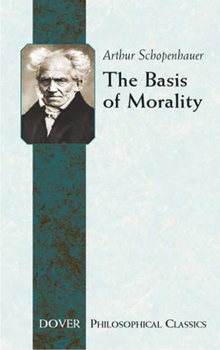The Basis of Morality
Select Format
Select Condition 
Book Overview
This edition originally published by Berghahn Books. Schopenhauer's treatise on ethics is presented here in E. F. J. Payne's definitive translation, based on the Hubscher edition (Wiesbaden,... This description may be from another edition of this product.
Format:Paperback
Language:English
ISBN:0486446530
ISBN13:9780486446530
Release Date:September 2005
Publisher:Dover Publications
Length:176 Pages
Weight:0.40 lbs.
Dimensions:0.3" x 5.2" x 8.4"
Customer Reviews
4 ratings
BOBWIRE
Published by Thriftbooks.com User , 15 years ago
Excellent read, but deep. I recommend that this treatise be read slowly. Reader should have a basic understanding of Kantian Ethics prior to reading this refutation.
Outstanding Philosophical Work
Published by Thriftbooks.com User , 16 years ago
This is the follow up to Schopenhauer's award-winning "Essay on the Freedom of the Will", which I seriously recommend BEFORE reading "The Basis of Morality". In this later volumn, the nineteenth century German philosopher clearly demonstrates his remarkable case by explaining the "ego" and the non-ego". It is when the individual has intense positive associative compassion for the non-self that morality is established, since compassion is the basis of goodness. His work is not merely his opinion, but a very carefully thought out theory, based on human experience in different cultures in all ages. His approach starts with a thorough analysis of Kant's Categorical Imperative and continues with many post-Kantian philosophers. Religious belief systems are significantly explored and shown to be irrelevant. Schopenhauer is not an anti-theist. Far from it. But, he claims that religious doctrine and dogma can at best curb malice, cruelty, and base actions on the part of believers. Schopenhauer is a lucid writer, though a bit caustic toward his competitors. The reader needs to take Schopenhauer for who he is. Then, the reader is free to sense a transforming thought about morality. "The Basis of Morality" transcends everything else I have read on the subject. Even if the reader chooses to disagree with this philosopher, at least the reader has been introduced to a concluding theory, worthy of both further investigation and debate.
Schopenhauer's Basis for Morality
Published by Thriftbooks.com User , 16 years ago
I would just like to agree with the above reviewer in saying that Schopenhauer's philosophy outshines just about any other from the 19th century. Many praise Schopenhauer's writing style or his wonderful prose, but I cannot honestly say that I think every word of Schopenhauer is valuable. His ideas are worth more than diamonds, but I find that a lot of his writing can be a bit flowery. In the Basis of Morality, Schopenhauer does quite a bit of wandering and I find it hard to stay interested when he starts critisising Kant. However, that being said, I managed to find his statement of compassion in about 1-2 sentences somewhere in the middle, and it is the best explanation of compassoin that I have found yet. To sum up in a sentence, as pointed out correctly by the above reviewer, since we are simply instances of will in living organisms, which are basically material imbued with the 'spark' or 'will' of life, compassion is simply the recognition that there is No Difference between us and any other life form, becuase we are all of the same living will.
An Absolutely Beautiful Book
Published by Thriftbooks.com User , 19 years ago
The nineteenth century produced many different systems of ethics. While Kant, Nietzsche, Mill, and Hegel all contributed greatly to ethical thought, the greatest contribution, in my opinion, came from Arthur Schopenhauer. On the Basis of Morality is not only a beautifully written book; it's quite simply, in my estimation, the most convincing (and humane) exposition on ethics that I've ever read. Schopenhauer's rightly hailed literary style is especially lucid here, and On the Basis of Morality is much more of an immediately digestible read as compared to The World as Will and Representation. Schopenhauer's elegant polemic against Kant's ethics of duty, i.e. the categorical imperative, is very effective. Schopenhauer deconstructs Kant's rational ethics with such prodding efficiency that it's amazing that Schopenhauer isn't mentioned more frequently as a corrective to Kant's ethical thought. Schopenhauer also makes it a point to mention that Kant's ethics rely heavily on theism, albeit in a clandestine way. Schopenhauer's ethical thought is atheistic to the core. The main thesis that Schopenhauer argues is that the basis of morality is compassion. In other words, the vast majority of so-called "moral" acts that we commit are in fact nothing of the sort. They are merely self-interested acts that we perform to either do what we are supposed to do, or because we will receive some sort of compensation. Schopenhauer's definition is quite different: only completely altruistic acts are moral. Another aspect of On the Basis of Morality that I find so appealing is that it mixes Kant's transcendental idealism with a Buddhist sense of compassion for all sentient beings. Schopenhauer appropriated Kant's idealism of the thing-in-itself, and he defines that as a blind will to live that permeates all things. Therefore, everything is interconnected via the Will. Schopenhauer reiterates that true morality is compassion for ALL living beings, not humans alone. Schopenhauer was very much ahead of his time in this respect. This is currently out of print, which is truly a shame. It's a great book by a great philosopher, and it deserves to be read.






